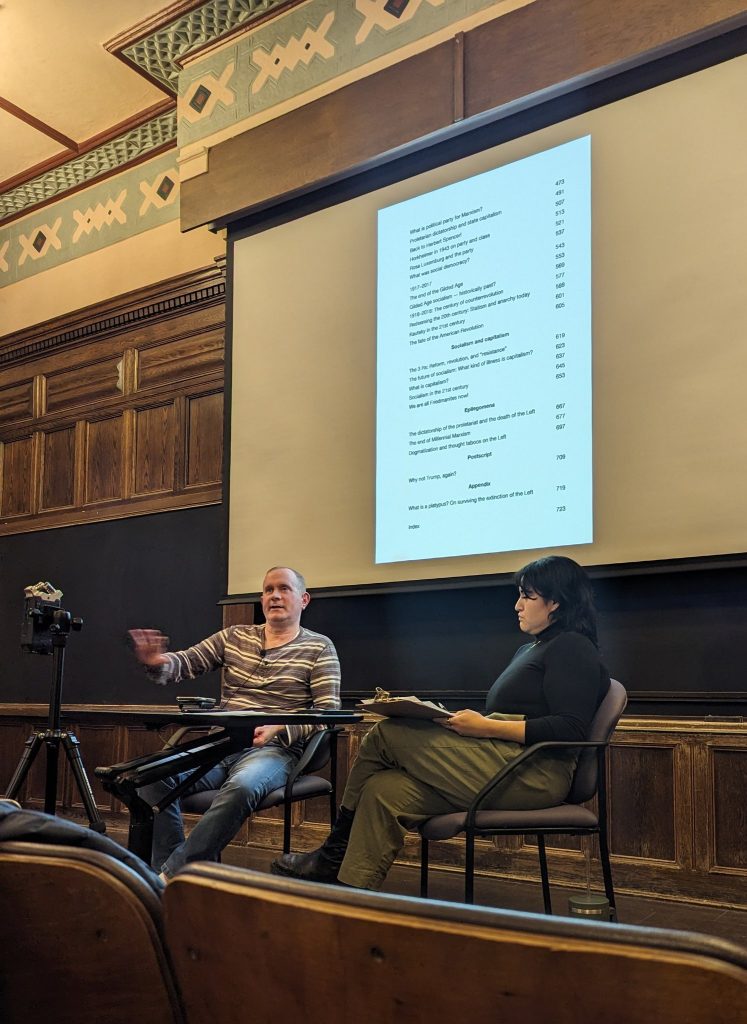Chris Cutrone and Douglas Lain discuss the essay “Do we need Adorno?” The essay was published in Nonsite in 2012 and is included in Cutrone’s new book Marxism and Politics: Essays on Critical Theory and the Party 2006-2024.
Chris Cutrone and Douglas Lain discuss the essay “Do we need Adorno?” The essay was published in Nonsite in 2012 and is included in Cutrone’s new book Marxism and Politics: Essays on Critical Theory and the Party 2006-2024.
Chris Cutrone debates Todd McGowan on Hegelian dialectics and Freudian theory through Marx, Lenin, Adorno and Lacan.
(Video starts at 7:29:00)
Chris Cutrone discussed his books The Death of the Millennial Left and Marxism and Politics with Nicholas Kiersey in the Department of Political Science at the University of Texas, Rio Grande Valley.

On April, 4th 2024 as a part of its 2024 International Convention, the Platypus Affiliated Society hosted a book talk from Chris Cutrone for his upcoming book Marxism and Politics: Essays on Critical Theory and the Party 2006–2024 at the University of Chicago. Preview available at:
https://www.academia.edu/118222480/Marxism_and_Politics_Essays_on_Critical_Theory_and_the_Party_2006_2024_extract
Chris Cutrone is the last Marxist. He teaches Critical Theory at the School of the Art Institute of Chicago and the Institute for Clinical Social Work and completed his PhD on Adorno’s Marxism at the University of Chicago, where he taught for many years in the Social Sciences Core Curriculum, and is the original lead organizer and chief pedagogue of the Platypus Affiliated Society. He is the author of Marxism in the Age of Trump (2018), The Death of the Millennial Left: Interventions 2006–2022 (2023) and Marxism and Politics: Essays on Critical Theory and the Party 2006–2024 (2024).
Chris Cutrone discusses the Norman Finkelstein vs. Destiny debate on the Lex Fridman show. How did the framing of this debate accept the very conditions that need to be overcome as immutable and permanent. How might socialists work to overcome these conditions? Chris Cutrone continues to discuss the Finkelstein debate, but we move on to discuss Frederic Jameson, the meaning of Academic Marxism, and what it is to be “pre-canceled” on the Left as a Marxist.
The Last Marxist Chris Cutrone discusses the meaning of the American Revolution, Trump remaining on the ballot, the branches of government, and the meaning of socialism.
Chris Cutrone returns for another CutroneZone, this time to explain what it means to live through “imperialism as the highest stage of capitalism.”
Chris Cutrone and Douglas Lain discuss the old Marxist idea of “The Dictatorship of the Proletariat” in this episode of the Cutrone Zone. Is it a scary phrase? Can we trust everyday people to self-govern? What is socialism anyhow?
Chris Cutrone and Douglas Lain discuss how Maoism came to define the ideology of the American Left as the CutroneZone returns in 2024. Doug and Chris continue to discuss Maoism and its aftermath in the Parrot Room, and touch upon the “Left” on Israel-Palestine.
Chris Cutrone of Platypus joins Aufhebunga Bunga, Philip Cunliffe, George Hoare, and Alex Hochuli, to talk about his collection of essays, The Death of the Millennial Left. We discuss: Why define it as the “Millennial” Left? Was the anti-Stalinism of leaderless protests a good thing? Did the talk of “winning” from 2015 onwards represent maturity? Should the turn to a more public, statist capitalism make us more optimistic? How will the ‘lawfare’ used against Trump play out?